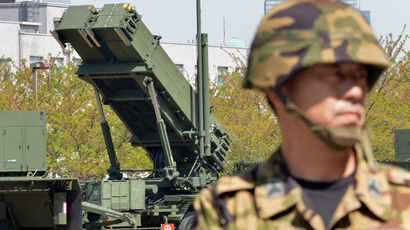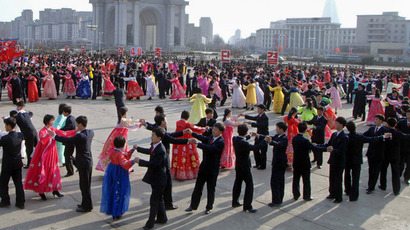Students slam BBC for 'gambling with lives' in N.Korea
The UK's top economics university has accused the BBC of gambling with students' lives after it emerged the BBC used unwitting students as cover to film in North Korea.
The London School of Economics said its students, who went to
North Korea on a study trip, could have been detained for years if
the BBC scam unraveled.
The LSE claims that BBC’s Panorama reporter John Sweeney posed
as one of the university’s professors, and took the students on an
alleged study trip in order to film an undercover documentary in
North Korea. The students were not aware that they were involved in
the filming of a documentary and the BBC did not warn them of the
imposed dangers, General Secretary of the LSE Students Union Alex
Peters-Day told RT.
According to Peters-Day, rather than make a concerted effort to
inform the entire student group headed to the country, individual
students overheard conversations in hotel lobbies and in minivans
en route to Beijing airport.
“A couple of years ago two American journalists were found to
have been doing undercover journalism in North Korea. They were
both sentenced to nine years of hard labor. Obviously, as we now
have just heard, the climate in North Korea is more heightened than
it was back then, but students should have had the right to make
the decision for themselves whether or not they are going to face
danger. The problem for us is that the BBC made that decision for
them,” Peters-Day told RT.
“The group was just told there would be a print journalist only.
It wasn’t actually until they arrived in North Korea that they were
told there would be a documentary in which they would be appearing.
It wasn’t until they arrived in Beijing to fly to North Korea that
they were joined by other journalists. When we are talking about a
trip like this, with such risks involved, it’s so important that
the students would have been briefed at all stages and would have
been made aware. They just weren’t in this case. The BBC
deliberately withheld information from them,” she said.
In addition to the potential danger to students, Peters-Day claims
that this situation potentially jeopardizes all academic work in
the UK, preventing future access for professors to
politically-sensitive countries.
“I know Universities UK, which represents over a hundred
universities in Britain, have come out and condemned the BBC for
doing that, because it places at jeopardy huge amounts of academic
research. And the problem is LSE academics and other academics do
work into regimes like North Korea, which is really insightful.
Whereas this is a tourist trip. I’m pretty certain the information,
the footage they will get would have been the same sort of footage
of tourist monuments and statues of Kim Jong-un, when actually the
important work that is done by universities uncovering
authoritarian regimes is now at risk and jeopardy,” added
Peters-Day.
The same sentiment was expressed in an email sent by the university
to students and staff: "It is LSE's view that the students were
not given enough information to enable informed consent, yet were
given enough to put them in serious danger if the subterfuge had
been uncovered prior to their departure from North Korea.”
According to an anonymous student present on the trip who spoke
with the BBC, they were not made aware of the presence of several
journalists working prior to their flight to Pyongyang. Rather,
students were told that John Sweeney was a history professor with
the university, though that subterfuge seemed to dissipate slowly
once the group had arrived in North Korea.
For its part, the BBC has thus far refused to pull the program,
while Craig Calhoun, director of the LSE, questions whether it was
worth it for anyone involved.
“The BBC story put LSE students at danger but seems to have
found no new information and only shown what North Korea wants
tourists to see," wrote Calhoun via Twitter.
Not everyone is entirely convinced that the BBC’s gamble was not
worth the risk. John Lloyd, director of journalism at the Reuters
Institute for the Study of Journalism, believes the timing and the
content of the program made it “extremely valuable.”
Regardless of whether the program will ultimately be viewed as
being of value, the incident comes at a delicate time for the BBC’s
Director General Tony Hall, who is still trying to navigate the
institution beyond last year’s accusations of a cover-up and
editorial failure over the Jimmy Savile sexual abuse scandal.
Perhaps even more damaging, according to one BBC news executive who
spoke with Reuters, the decision to embed journalists with the LSE
student group had been “right to the top,” and involved Hall in at
least some regard.














